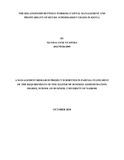| dc.description.abstract | The relationship between working capital variables and profitability has disclosed both negative and positive association. Empirical results show that accounts receivables period and leverage significantly and negatively affect profitability. The negative relationship between accounts receivable period and profitability may be due to customers wanting more time to get quality goods from a firm with declining profitability. Some empirical findings conflict financial models explaining trade credit, trade credit are more profitable short term investments than marketable securities it is therefore rational for high profit firms that are more liquid, to transfer relatively high amounts of trade credit to the buyers, in accordance to liquidity theory, liquid firms are less likely to demand trade credit and are likely to offer credit. Firms may have an optimal level of working capital that maximizes their value.
Large inventory and a generous trade credit policy may lead to high sales. Larger inventory reduces the risk of a stock-out. Trade credit may stimulate sales because it allows customers to assess product quality before paying. The purpose of this study was to establish the relationship between Working Capital Management and Profitability of retail supermarket chains in Kenya. The research was a causal study design. The population of this study consisted of the 6 retail supermarket chains in Kenya these ~e Nakumatt, Tuskys, Uchumi, Ukwala, Naivas, and Eastmatt. The research used data of the selected retail chains, the data was collected covered a five year period starting from 2005 to 2009. The research used secondary data that was obtained from financial statements of the companies and multiple regression analysis was employed.
The study found that there exist a relationship between Working Capital Management and Profitability of retail supermarket chains in Kenya. It was also established that The study recommends that for supermarkets to remain profitable they should have working capital management which will help in making decisions about investment mix and policy, matching investments to objectives,' asset allocation for institutions, and balancing risk against profitability. Working capital management techniques in supermarkets should focus more on strategic issues for profitability and the ability to achieve strategic objectives. Average Collection Period was found to have a weak non-significant negative relationship with NOP, average payment period was found to have a non-significant negative relationship with NOP, CCC has a weak but significant positive relationship with NOP and Debt ratio was found to have
a non-significant positive relationship with NOP. | en_US |

